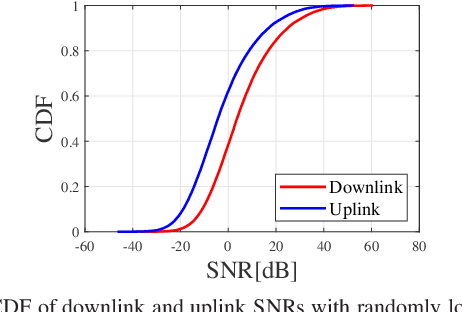Yahia Ahmed
SegOTA: Accelerating Over-the-Air Federated Learning with Segmented Transmission
Apr 13, 2025Abstract:Federated learning (FL) with over-the-air computation efficiently utilizes the communication resources, but it can still experience significant latency when each device transmits a large number of model parameters to the server. This paper proposes the Segmented Over-The-Air (SegOTA) method for FL, which reduces latency by partitioning devices into groups and letting each group transmit only one segment of the model parameters in each communication round. Considering a multi-antenna server, we model the SegOTA transmission and reception process to establish an upper bound on the expected model learning optimality gap. We minimize this upper bound, by formulating the per-round online optimization of device grouping and joint transmit-receive beamforming, for which we derive efficient closed-form solutions. Simulation results show that our proposed SegOTA substantially outperforms the conventional full-model OTA approach and other common alternatives.
Improving Wireless Federated Learning via Joint Downlink-Uplink Beamforming over Analog Transmission
Feb 04, 2025


Abstract:Federated learning (FL) over wireless networks using analog transmission can efficiently utilize the communication resource but is susceptible to errors caused by noisy wireless links. In this paper, assuming a multi-antenna base station, we jointly design downlink-uplink beamforming to maximize FL training convergence over time-varying wireless channels. We derive the round-trip model updating equation and use it to analyze the FL training convergence to capture the effects of downlink and uplink beamforming and the local model training on the global model update. Aiming to maximize the FL training convergence rate, we propose a low-complexity joint downlink-uplink beamforming (JDUBF) algorithm, which adopts a greedy approach to decompose the multi-round joint optimization and convert it into per-round online joint optimization problems. The per-round problem is further decomposed into three subproblems over a block coordinate descent framework, where we show that each subproblem can be efficiently solved by projected gradient descent with fast closed-form updates. An efficient initialization method that leads to a closed-form initial point is also proposed to accelerate the convergence of JDUBF. Simulation demonstrates that JDUBF substantially outperforms the conventional separate-link beamforming design.
Uplink Over-the-Air Aggregation for Multi-Model Wireless Federated Learning
Sep 02, 2024

Abstract:We propose an uplink over-the-air aggregation (OAA) method for wireless federated learning (FL) that simultaneously trains multiple models. To maximize the multi-model training convergence rate, we derive an upper bound on the optimality gap of the global model update, and then, formulate an uplink joint transmit-receive beamforming optimization problem to minimize this upper bound. We solve this problem using the block coordinate descent approach, which admits low-complexity closed-form updates. Simulation results show that our proposed multi-model FL with fast OAA substantially outperforms sequentially training multiple models under the conventional single-model approach.
Joint Group Scheduling and Multicast Beamforming for Downlink Large-Scale Multi-Group Multicast
Mar 15, 2024



Abstract:Next-generation wireless networks need to handle massive user access effectively. This paper addresses the problem of joint group scheduling and multicast beamforming for downlink multicast with many active groups. Aiming to maximize the minimum user throughput, we propose a three-phase approach to tackle this difficult joint optimization problem efficiently. In Phase 1, we utilize the optimal multicast beamforming structure obtained recently to find the group-channel directions for all groups. We propose two low-complexity scheduling algorithms in Phase 2, which determine the subset of groups in each time slot sequentially and the total number of time slots required for all groups. The first algorithm measures the level of spatial separation among groups and selects the dissimilar groups that maximize the minimum user rate into the same time slot. In contrast, the second algorithm first identifies the spatially correlated groups via a learning-based clustering method based on the group-channel directions, and then separates spatially similar groups into different time slots. Finally, the multicast beamformers for the scheduled groups are obtained in each time slot by a computationally efficient method. Simulation results show that our proposed approaches can effectively capture the level of spatial separation among groups for scheduling to improve the minimum user throughput over the conventional approach that serves all groups in a single time slot or one group per time slot, and can be executed with low computational complexity.
Multi-Model Wireless Federated Learning with Downlink Beamforming
Jan 15, 2024

Abstract:This paper studies the design of wireless federated learning (FL) for simultaneously training multiple machine learning models. We consider round robin device-model assignment and downlink beamforming for concurrent multiple model updates. After formulating the joint downlink-uplink transmission process, we derive the per-model global update expression over communication rounds, capturing the effect of beamforming and noisy reception. To maximize the multi-model training convergence rate, we derive an upper bound on the optimality gap of the global model update and use it to formulate a multi-group multicast beamforming problem. We show that this problem can be converted to minimizing the sum of inverse received signal-to-interference-plus-noise ratios, which can be solved efficiently by projected gradient descent. Simulation shows that our proposed multi-model FL solution outperforms other alternatives, including conventional single-model sequential training and multi-model zero-forcing beamforming.
Joint Beamforming and Device Selection in Federated Learning with Over-the-air Aggregation
Feb 28, 2023



Abstract:Federated Learning (FL) with over-the-air computation is susceptible to analog aggregation error due to channel conditions and noise. Excluding devices with weak channels can reduce the aggregation error, but also decreases the amount of training data in FL. In this work, we jointly design the uplink receiver beamforming and device selection in over-the-air FL to maximize the training convergence rate. We propose a new method termed JBFDS, which takes into account the impact of receiver beamforming and device selection on the global loss function at each training round. Our simulation results with real-world image classification demonstrate that the proposed method achieves faster convergence with significantly lower computational complexity than existing alternatives.
 Add to Chrome
Add to Chrome Add to Firefox
Add to Firefox Add to Edge
Add to Edge